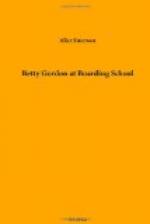In a few moments she came out, a heavy corduroy robe and slippers protecting her against the night air.
“Esther, lamb, you stay here in the hall with Bob,” she directed her youngest daughter. “You won’t be afraid with Bob, will you, dear? I don’t want too many to go down or we may startle Libbie.”
Betty crept downstairs after Mrs. Littell, the soft, thick rugs making their progress absolutely noiseless. Not a step in the well-built staircase creaked.
They found the chain and bolt drawn from the heavy front door. Libbie had evidently let herself out with no difficulty. From the wide hall window Bob and Esther watched breathlessly.
“Just go up to her quietly and take one of her hands,” Mrs. Littell whispered to Betty. “I’ll take the other, and, if I’m not mistaken, we can lead her into the house.”
Libbie stood motionless beside a rosebush as they approached her. Her eyes were wide open, and her dark hair floated over her shoulders. In her white nightdress, the moonlight full upon her, she looked very pretty and yet so weird that Betty could not repress a shiver.
Mrs. Littell did not speak, but took one of the limp hands in hers, and Betty took the other. Libbie made no resistance, and allowed them to draw her toward the house. They crossed the threshold, led her upstairs, past the quivering Esther and Bob huddled on the windowseat, and into the bedroom she had so unceremoniously left.
Then Mrs. Littell lifted her in strong arms, put her gently down on the bed, and Libbie rolled up like a little kitten, tucked one hand under her cheek and continued to sleep.
“Now go to bed, children, do,” commanded Mrs. Littell. “Bob, I’m so thankful you saw that child—she might have wandered off or caught a severe cold. As it is, I don’t believe she has been out very long. What’s the matter, Esther?”
“Can I come and sleep with you?” pleaded Esther. “I’m afraid to sleep with Libbie. She might do it again.”
“I don’t think so—not to-night,” said her mother, smiling. “However, chicken, come and sleep with me if you’ll rest better.”
Betty awoke and went in later that night to see if Libbie had vanished again, but found her sleeping normally. In the morning the girl was much surprised to find she had been wandering in the garden and betrayed considerable interest in the details. Betty decided that it would be better to omit Esther’s belief that she had eloped, and Libbie was allowed to remain in blissful ignorance of the action her youthful cousin attributed to her.
The last day sped by all too soon, and what the Tucker twins persisted in pessimistically designating the “fateful Thursday” was upon them.
“I don’t know why you sigh so frequently,” dimpled Betty, who sat next to Tommy Tucker at the breakfast table. “I’m very anxious to go to school. Don’t you really like to go back?”
“It’s like this,” said Tommy, the “dark Tucker twin,” solemnly. “From four to ten p.m. (except on drill nights) I like it well enough, and from ten, lights out, till six, reveille, I’m fairly contented. But from nine to four, when we’re cooped up in classrooms, I simply detest school!”




